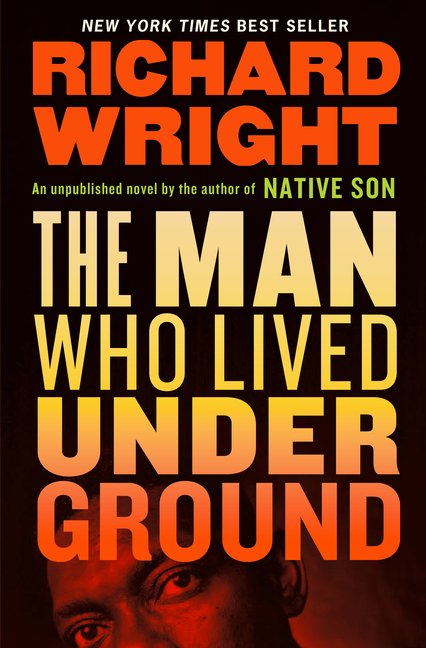
Written by Lynda D. Sleeter
Edited by Sadie Kimbrough
The release of a previously unpublished novel by Richard Wright (1908-1960), legendary author of Native Son (1940) and Black Boy (1945) is possibly the major literary event of the summer. The Man Who Lived Underground (1961) is a masterpiece that Wright was not able to publish during his lifetime. By special arrangement with his estate, this work that meant more to Wright than any of his others (“I have never written anything in my life that stemmed more from sheer inspiration”) has been published in its entirety along with a companion essay, “Memories of My Grandmother” and an afterword by his grandson Malcom Wright.
The Man Who Lived Underground is Wright’s best single piece of imaginative writing. This work represents Wright’s ingenious attempt at creating a more fluid and ambiguous universe. One where crimes were once determined by social conditions as in Native Son, and were sometimes rationalized, they are now presented as acts of accidental impulse.
It is a gripping and explosive novel about race and police violence that chronicles the experience of Fred Daniels, a Black man who is picked up by police and is tortured into confessing to a brutal double murder that he never committed. After signing his forced confession, Daniels flees and disappears into the city’s sewer system via a loose manhole cover to become a resident of the underground. While living in the sewer system, Daniels grapples with his own sense of guilt and innocence. His journey through the dark underground leads to enlightenment, a sense of self-maturity, and eventually his death. Thematically, the story explores guilt, innocence, freedom, imprisonment, racial prejudice, materialism, and what it means to be an African-American man in 1940s America.
As Daniels travels through the underground tunnels, he makes many discoveries. His first find is the basement of a Black church. While listening to the singing congregation he cannot understand people’s collective need to state their innocence when they are guilty of nothing. In juxtaposition, by the story’s end Daniels sheds his own sense of guilt, realizing that it is an innate human emotion regardless of a person’s innocence or not. While journeying through the sewer, Daniels also discovers a dead infant floating in the water which he shoves aside and then stumbles upon an undertaker’s embalming room in a funeral home. While peering through a hole in the wall, he sees a dead white man on a table. These two experiences make Daniels laugh at the realization that the racial and sexual prejudices of aboveground society do not exist in death, thus providing him a sense of justice.
Daniels steals a multitude of items while underground: a toolbox from the funeral home, sandwiches from an elderly coal-bin worker, a typewriter, and a radio. He steals items from a jewelry store, money from a safe, and a gun from a night-watchman. He finds no intrinsic value in the items he steals and uses them to adorn the cave that he has carved out for himself, thus showing his devalued view of material things.
Fundamentally, The Man Who Lived Underground is about the perils of the sociopolitical choice of living in complete isolation. Wright meticulously illustrates how separation from the above ground world slowly debilitates Daniel’s moral character, and eventually his human essence. The protagonist slowly loses the realization of how his actions are related to others, his sense of moral values, and the pragmatic awareness of actual effects.
The novel ends with Daniels going directly to the police to confess to the crimes he actually did commit while living underground, but they dismiss him as being crazy. He insists that the police arrest him and asks that they accompany him down into the sewer to the cave he carved out for himself while living underground. The officers follow him to the manhole covering the sewer. After Daniels descends the ladder, they shoot and kill him. Just like the dead floating baby that Daniels saw early on in the story, his own corpse is washed away by the rapid current of the sewer water.
The metamorphosis that Daniels undergoes while being a dweller of the underground reveals that once man becomes the sole and ultimate judge of his own actions, he also becomes his own God, and anyone so completely emancipated from outside authority is capable of crime without guilt and honesty without discretion. The man who lived underground loses his human identity. A final point made by Wright’s piece is that escape into total isolation, while attractive at first, inevitably condemns the escapee to qualities that are not wholly human. The Man Who Lived Underground is the kind of literary work that will remain with you for years after you have read it.



